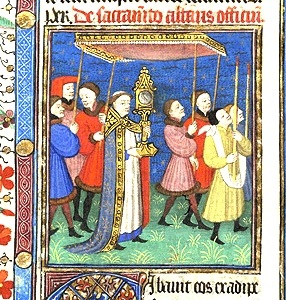The Feast of Corpus Christi
June 19, 2014

Corpus Christi Procession
from Missal
French (possibly Angers), ca. 1427
New York, Morgan Library
MS M146, fol. 141 (detail)
THE institution of the Holy Eucharist was the greatest act of love in human history. The Eucharist is a never-ending well-spring of love. Jesus made it plain that he was not speaking metaphorically when he referred to the bread as his flesh and the wine as his blood:
The Jews therefore strove among themselves, saying, How can this man give us his flesh to eat? Then Jesus said unto them, Verily, verily, I say unto you, Except ye eat the flesh of the Son of man, and drink his blood, ye have no life in you. {John 6:52-53}
It is through the Blessed Sacrament, the source and summit of the other sacraments, that Christ reigns in the souls of men so that they can in turn make this world reflect some of the glory of its Creator. We are called to form one Mystical Body with this sacred mystery at its center.
Today, the Feast of Corpus Christi, a day which was once filled with processions, is devoted to this ongoing miracle. Here are some words on the subject from St. Alphonsus de Liguori, from his work The Holy Eucharist:
Our holy faith teaches us, and we are bound to believe, that in the consecrated Host Jesus Christ is really present under the species of bread. But we must also understand that He is thus present on our altars as on a throne of love and mercy, to dispense graces and there to show us the love which He bears us, by being pleased to dwell night and day hidden in the midst of us.
It is well known that the Holy Church instituted the festival of Corpus Christi with a solemn octave, and that she celebrates it with the many usual processions, and so frequent expositions of this Most Holy Sacrament, that men may thereby be moved gratefully to acknowledge and honor this loving presence and dwelling of Jesus Christ in the Sacrament of the Altar, by their devotions, thanksgivings, and the tender affections of their souls. O God! how many insults and outrages has not this amiable Redeemer had, and has He not daily, to endure in this Sacrament on the part of those very men for whose love He remains upon their altars on earth! Of this He indeed complained to His dear servant St. Margaret Mary Alacoque, as the author of the Book of Devotion to the Heart of Jesus relates. One day, as she was in prayer before the Most Holy Sacrament, Jesus showed her His heart on a throne of flames, crowned with thorns, and surmounted by a Cross, and thus addressed her: “Behold that heart which has loved men so much, and which has spared itself nothing; and has even gone so far as to consume itself, thereby to show them its love; but in return the greater part of men only show Me ingratitude, and this by the irreverences, tepidity, sacrileges, and contempt which they offer Me in this Sacrament of love; and that which I feel the most acutely is, that they are hearts consecrated to Me.” Jesus then expressed His wish, that the first Friday after the octave of Corpus Christi should be dedicated as a particular festival in honor of His adorable Heart; and that on that day all souls who loved Him should endeavor, by their homage, and by the affections of their souls, to make amends for the insults which men have offered Him in this Sacrament of the Altar; and at the same time He promised abundant graces to all who should thus honor Him.
We can thus understand what our Lord said of old by His prophet, that His delight is to be with the children of men; [Prov. viii. 31] since He is unable to tear Himself from them even when they abandon and despise Him. This also shows us how agreeable all those souls are to the heart of Jesus who frequently visit Him, and remain in His company in the churches in which He is, under the sacramental species. He desired St. Mary Magdalene of Pazzi to visit Him in the Most Blessed Sacrament thirty-three times a day; and this beloved spouse of His faithfully obeyed Him, and in all her visits to the altar approached it as near as she possibly could, as we read in her life.
But let all those devout souls who often go to spend their time with the Most Blessed Sacrament speak;—–let them tell us the gifts, the inspirations which they have received, the flames of love which are there enkindled in their souls, the paradise which they enjoy in the presence of this hidden God.
— Comments —
John G. writes:

